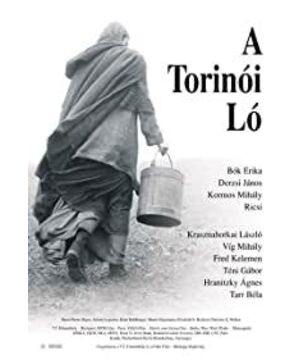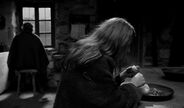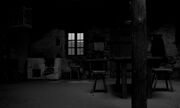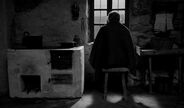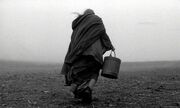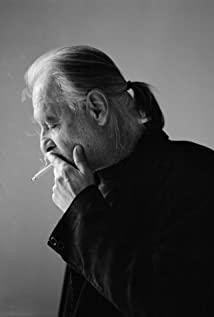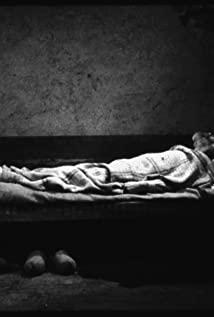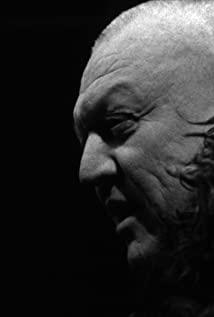Whoever does not have a house at this time does not have to build whoever is lonely at this time, will always be lonely - the story of Rilke's "Autumn Day" "The Horse of Turin" begins with Nietzsche on January 3, 1889 in El Port, Turin The legendary anecdote of weeping with horses in the square, followed by Nietzsche's insane and nerve-wracking ten-year journey through life (in fact, the film's narration is wrong, Nietzsche was in a state of madness after the horse incident in Turin. lived eleven years). Since then, the legendary story of the horse of Turin has become a famous koan in the philosophical world. As for what happened in Nietzsche's "horse and weeping", where did the horse go? Or what kind of spiritual catalysis and inspiration there is between Nietzsche and the horse, in fact, it is impossible to explain. It's just that Nietzsche made a thought-provoking sigh before going crazy: Mom, I'm stupid! In Bella Tarr's film "Horse of Turin", except for the legend of "Horse of Turin" at the beginning, there is no Nietzsche in the whole film, but a popular movie titled "Horse of Turin" The fable of the world has to start with Nietzsche's crazy events, not to increase the legend of the story. Obviously, Bella Tarr intends to use a modern "revelation" to explore a Nietzsche's philosophical world.
Of course, it would make sense if Bella Tarr used the poor life of a disabled groom and her daughter as a metaphor for Nietzsche's maddened ten-year life, but such a treatment may not be clever, not to mention that at the beginning of the film, the director arranged such a Monologue: "As for whether this horse is the Turin horse of that incident, it is unknown." It can be said that Bella Tarr did not continue to write a story, and "The Turin Horse" is not in the As a metaphor for a text (Thus Spoke Nietzsche's "Thus Spoke Zarathustra"), it is clear that the film and Nietzsche have a parallel textual relationship, such as allegory and life, which corroborate each other, alienate and resist, and are integrated into one. The film adopts Bella Tal's usual aesthetic style, black and white narrative, metaphorical undercurrent, grainy lens power and poetic scene scheduling. The whole film is shot by 30 almost perverted long shots, and the overall chapter structure is laid out and narrated. It renders a depressing image of doomsday, making people speechless with depression and dullness. It is not so much a plot as it is extremely lyrical, and the lightly narrated story is more like a poetic collage in a philosophical context. Under all the shots, it is just a repetition of the groom and his daughter six. The monotonous living conditions in the day: dressing, fetching water, feeding horses, cooking, eating potatoes, undressing, falling asleep, etc. Although the camera experience and aesthetic impact brought by each occurrence of such a scene are different, But it is still unavoidable to give the audience a trivial sense of nihility. The simple story structure supports a philosophical labyrinth-like tower. Obviously Tarr is trying to complete the huge project of reverse Genesis, because God created the world in seven days, Tarr only took six days to destroy and fall.
On the first day, the father and daughter had such an intriguing conversation before going to sleep: Father (groom): Did you hear anything? Daughter: What sound, no. Father (groom): I've heard the sound of worms eating wood for 58 years, but I can't hear it now. Daughter: Maybe they stopped, do you know why they stopped? Father (groom): I don't know. Voice-over: The daughter looked at the ceiling and the father looked at the window throughout the night. Outside the stone house, the sound of tiles being blown off by the wind can be heard.
These extremely boring and trivial conversations, like their daily life, have constructed the poor state of existence of the father and daughter, which is not only difficult to survive, but also spiritual desolation. They seem to be placed on an island abandoned by God. It is a door to nihilism, the repetition of daily suffering, the constant search and denial of meaning. During these six days, the conditions of life have deteriorated, and the spirit has become more and more desolate. Perhaps, Groom's "I don't know" is the foreshadowing of the sacred destruction of this small world.
On the second day, the horse refused to go out. No matter how the groom beat him, the tired and paralyzed horse no longer wanted to move. This scene reminds us of the groom who whipped the Turin horse in Nietzsche's story. If there is Nietzsche in Turin Weeping with horses, but here, there is the admonition of a kind daughter: it will not listen to you. The compromise of Mafu's actions here actually means that the small world has since been separated from the whole big world "over the mountain". The father and daughter continue to repeat the meaninglessness, while Ma'er began to refuse to be sent, and also began to refuse to eat. The revolt of meaning begins to take place quietly.
If the tone of the whole film is almost calm and trivial, like water, then the visit of the wine buyers on the third day and the passing of the gypsies on the fourth day are the most lively and noisy parts of the film, and also the whole film. A gorgeous chapter with Nietzschean thought and biblical light, just like the repeated propositions and melody of a polyphonic piece of music, suddenly adding a torrent of sound, making a symphony stand. The visit of the wine buyer is to enter the "small world" as a preacher, and its large exposition exceeds almost all the lines in the film, and its preaching is nothing more than two parts: first, it is about Nietzsche's superman. The magnanimity of philosophy, this monologue is very Zarathustra's inner tendencies, such as God is dead. Second, wine buyers are quick to dismiss the theory, which seems to imply the limitations of Mafnitz's superhuman philosophy. However, the groom drove away the wine buyers with a "nonsense". Obviously, the wine buyer did not appear out of thin air. When he was driven by the groom, he did not argue at all. He took the wine and went to the distant road and the endless wind, and the long shot continued to follow. In fact, the wine buyer can be regarded as a Nietzschean, but not the Nietzsche of the superhuman philosophy, but the Nietzsche after the horse was crying. Obviously, this divine preaching is to Nietzsche's "Mom, I'm stupid" echo. However, the high-flying departure of the wine buyers actually represented the first disappearance of divine will. Although Nietzsche once preached that "God is dead", it does not mean that Nietzsche is really anti-Christ and God. There is a deep misunderstanding of Nietzsche here. Nietzsche's "God is dead" is the divinity after despair of human nature. Contempt, a sense of powerlessness and annihilation of emptiness and reincarnation, but the appearance and departure of wine buyers actually means the guidance of God's messenger. Unfortunately, the groom does not mean "the collapse of the small world". Instead, the camera was given to the kind daughter, who for the first time flashed the desire for "the other side of the mountain" in her eyes.
The appearance of the gypsies on the fourth day is even more of a divine enlightenment. The gypsies who had been exiled all the way wanted to kidnap the groom's daughter, but failed. At this time, we notice that the daughter's driving behavior has a kind of rebellious attachment, and The groom cursed and drove away with the primitive barbarism of the axe. In her daughter's heart, she yearns for the outside world, just as the gypsy metaphors: where there is no water, there is water elsewhere; where there is no light, there is light elsewhere. Gypsies, though homeless, have a free will of God, a spirit of total destruction and reconstruction. The Gypsies said this before being driven out: These lands and waters are ours. The implication: you will lose the land and the water. As a result, God's "blessing" came to the groom for the second time, but again he didn't realize it. If the wine buyer only metaphysically intervened in the event itself with Nietzsche's theory, but did not promote it, then the intrusion of the gypsies actually had a stronger action direction, but was also rejected by the groom, a Nietzsche who believed in superhuman philosophy The critic slowly degenerates into a philosophical view of the philosophical. Groom does not admit the absence of the soul, let alone the paradox of existence, and he continues to go his own way.
Unexpectedly, on the fifth day, the "prophecy" of the Gypsies was fulfilled: the water in the well dried up. The death further advanced, and the migration journey to "the other side of the mountain" began. Clothes, baggage, and carriages were all ready. However, the migration was shelved again. First, it was because of the groom's adherence to the inherent philosophy and his commitment to "home". Attachment, the second is the panic of the whole peripheral world. At this time, home and house become a cage. It is not that people are attached to home, but the house (foreign object) imprisoned people. Okay, because they're not gypsies with nothing, and they can't let go of everything. From the fifth day onwards the horse refused to drink, although the daughter begged: For my sake, drink some water! But the horse was indifferent. At this time, there is a detailed contrast that needs to be pointed out: the gypsy horse, the strong contrast between the two strong white horses and the groom's black horse in time and space, the gypsy horse is free and born, while the groom's horse is born from The refusal on the first day to the utter indifference on the fifth day shows that the groom's horse is dying, yes, it is begging for death. So let's go back to the Turin incident on January 3, 1889, when Nietzsche was crying with his horse in his arms: yes, it was also begging for death. And Nietzsche's cry is undoubtedly devastating, all the foundations of life of divinity and humanity crumble, with endless contempt and ridicule.
Fifth day, night. The house was dead silent, and the wind outside the window stopped. In fact, this narration also implies that the small world in the house has "sinked to death" on the fifth day, and death has occurred. Then the previous five days of strong winds and howling barrens came to an end. Here is a metaphor of spatial vertical imagination. We need to know that the small world in which the father and daughter live has been isolated from the world. All the inner life in the small world is just being consumed. The director did not use the lens to give the outline of the whole outside: it is real The ruins, or the bustling streets? Most are the return home of the groom on the road, the most are the occasional passing by of wine buyers and the unfortunate intrusion of gypsies. All foreign experiences are constructed solely by transmission and imagination. Then, around the cost of food and clothing for father and daughter, there is actually an inner closed cycle between wells, horses, trees, people and light and shadow. Although the road is open, it refuses all the time. The same imagination comes from external experience, from the director's narration. The external world has never really been presented, but only entered the interior with the moral preaching of the Apocalypse. From this, we can imagine: the reason why the director is reluctant to keep the camera, even if It is a memory to the outside world, because the outside world itself is a fiction, and the foreign object itself is a fall. It turns out that our self-enclosed small world (inside the spirit) is not a part, but a primitive state of existence. Yes, it is seeking death, and it is falling as a whole, representing the great flood of life.
On the sixth day, if the lamp does not light up again, it is not because the oil is exhausted, but the lamp withered by the complete destruction of the free will of the subject. As mentioned above, on the night of the fifth day, death has already occurred, so the lamp does not light on the sixth day. But it is the repetition of the meaning of life in death, just as the six-day daily life of death repeats the meaning of death in life. When the groom peeled raw potatoes with one hand, he said to his daughter sternly and with a regressive expression: Eat, we must eat! The daughter's expression was sluggish, and like a horse of Turin, she fell into absolute emptiness, like a statue, begging for death. The best death is the ultimate desire. If God created the world in seven days, then it can be said that Tarr was destroyed in six days, no, it has fallen in five days, and the sixth day is a complete affirmation of death and absolute abandonment of spiritual burdens. God created water and light, and Tar destroyed water and light, God warned the world in the Ten Commandments, do not have greed, possession of other people's houses and property. But what is not occupation, where is not a cage? Even his nostalgia and home are the same. Therefore, in Tarr's world, destruction and failure are eternal, which confirms Nietzsche's "death, inevitable; weak, unchanging; pain, absolute; existence, worthless; life, overwhelmed; destruction, imminent" The Zarathustra-esque Apocalypse, although Tarr once demonstrated Nietzsche's superhuman philosophy, re-evaluating all values, reconstructing the limitations of meaning, etc., but he returned to the Zarathustra-esque pain with great compassion and approval. the road. If you pay attention carefully, you may find that the sleeping position of the groom in the film is very similar to that of Jesus, the contrast and unity of mediocrity and divinity, and the scene of eating potatoes at the end is like the absurd solemn moment of the Last Supper, a modern-style sigh Metaphors slowly entered the eternal night with the mirror language of dead silence and chaos and inhumaneness of heaven and earth.
So what is the suspense for the audience? What is the seventh day of Tarr, maybe the subtext is: eternal reincarnation, reassessment, life begins again, failure continues, destruction continues. The will that transcends the will to power acquires meaning in the mediocrity of change, and our "must eat" constitutes the dignity of life in reincarnation, the burden on the spirit and the burden on the body, forever echoing in silence. Perhaps to Tarr, God is indeed a joke, but the death of God is precisely the expectation of the supreme and omnipotent divine power. The divine nature obtained by destroying, revaluing and rebuilding is a kind of transcendence of human nature. The tragic power of the tragic, such as Sisyphus who always pushes the stone up the mountain, the refusal is there from the beginning, just like the refusal in the highest sense of Nietzsche and the horse of Turin, calm and forbearance, endless, but maintaining the dignity of the individual life! But it is clear that Tarr is not restoring a Nietzschean philosophical world, but detours a road of revelation belonging to Tarr between God and Nietzsche.
View more about The Turin Horse reviews


